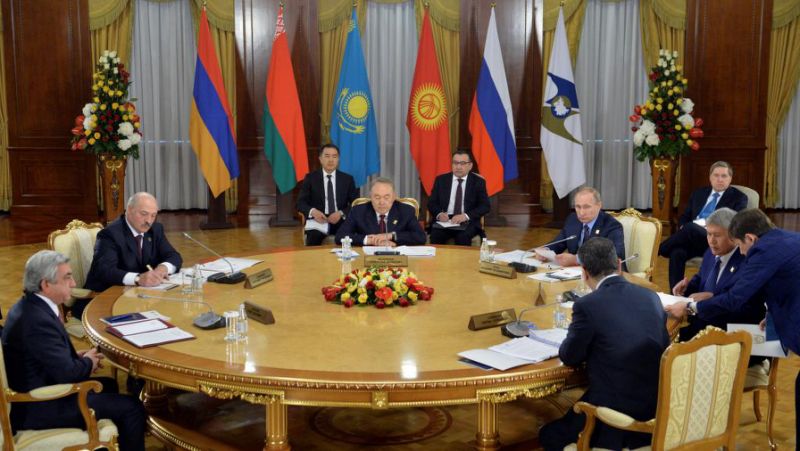
The Eurasian Economic Union (EAEU) is a Russian-run structure, loosely modelled on the European Union.
The guests of honour at the recent summit in Yerevan, capital of Armenia, were leaders from Iran and Singapore, and Russian president Vladimir Putin. How will the EAEU cope with the harsh competition from China’s Belt and Road, and the EU’s Eastern Neighbourhood Policy?
The Eurasian Economic Union was born in 1994 when Kazakhstan President Nursultan Nazarbayev proposed greater cooperation between former Soviet states, a streamlined version of the Commonwealth of Independent States.
The EAEU is neither the first time nor the last time we will see such an attempt
The idea was given more solid form by Russian President Vladimir Putin in 2011 and the EAEU came officially into existence on January 1, 2015.
Today the union includes Armenia, Belarus, Kazakhstan, Kyrgyzstan and Russia. Initially, Ukraine was also to be a member but, after the change of guard from a pro-Russian government to a pro-EU leadership in 2014 and subsequent tension with Moscow, Kiev lost its appetite for the EAEU and aimed for a free trade agreement with Brussels.
Today the structure claims to have an integrated single market of 183 million people with a gross domestic product of over 3,67 trillion Euro (the EU has a population of 513,5 million people with a gdp of 17,22 trillion Euro).
Iran looks for economic respite
For Iran, suffering under renewed US sanctions and vague commitments from Brussels, EAEU membership may give some relief.
On August 28, Iran and the EAEU signed a free trade agreement that will become operational at the end of October.
Iran will also avoid trading in dollars when it deals with the EAEU, as member states are gradually replacing the US currency with local denominations.
“Iran has become genuinely frustrated with its attempts to accommodate the west,” says Richard Giragossian, director of the Yeravan-based Regional Studies Center, pointing out that “Iran has not yet completely given up on looking to Europe,” as Germany, France and the UK, the three European partners in the Joint Comprehensive Plan of Action, or nuclear deal, are still trying to salvage the agreement, in spite of the US unilaterally walking away from it in May 2018.
Serbia: EAEU or EU?
Serbia, with strong ties to Moscow, hesitates between EAEU membership and trying to join the EU. In August, Serbia’s Tanjug News Agency quoted the European Commission as saying that Serbia “wil have to terminate” any deal it makes with the EAEU if it ever wants to join the European Union.
The remarks came after Russian ambassador to Belgrade Alexander Botsan-Kharchenko announced Serbia’s possible accession to the EAEU at the end of October.
“It derails their ambition” to ever enter the EU, says Giragossian. “Serbia probably would be making a strategic mistake by looking into the Eurasian Economic Union instead of the European Union.” As a result, Serbia did not even send observers to the Yerevan summit.
China’s Belt and Road moves on
Meanwhile, China’s Belt and Road Initiative is having an impact across the EAEU, and Moscow does not share Brussel’s fear of China’s increasing economic might on the Eurasian continent.
On 26 April 2019, the leaders of Russia and China met on the sidelines of the Belt and Road Forum in Beijing, and Russian President Vladimir Putin told his Chinese host Xi Jinping that "countries gathering under the Belt and Road Initiative and the Eurasian Economic Union share long-term strategic interests of peace and growth.”
Yet Giragossian remains sceptical. “the Chinese focus on infrastructure and moving westward is perhaps overwhelming the EAEU,” pointing out that this union is too much "a Russian-directed attempt at reintegration with the former Soviet Union order.
“The EAEU is neither the first time nor the last time we will see such an attempt,” he concludes.
Original source: RFI




